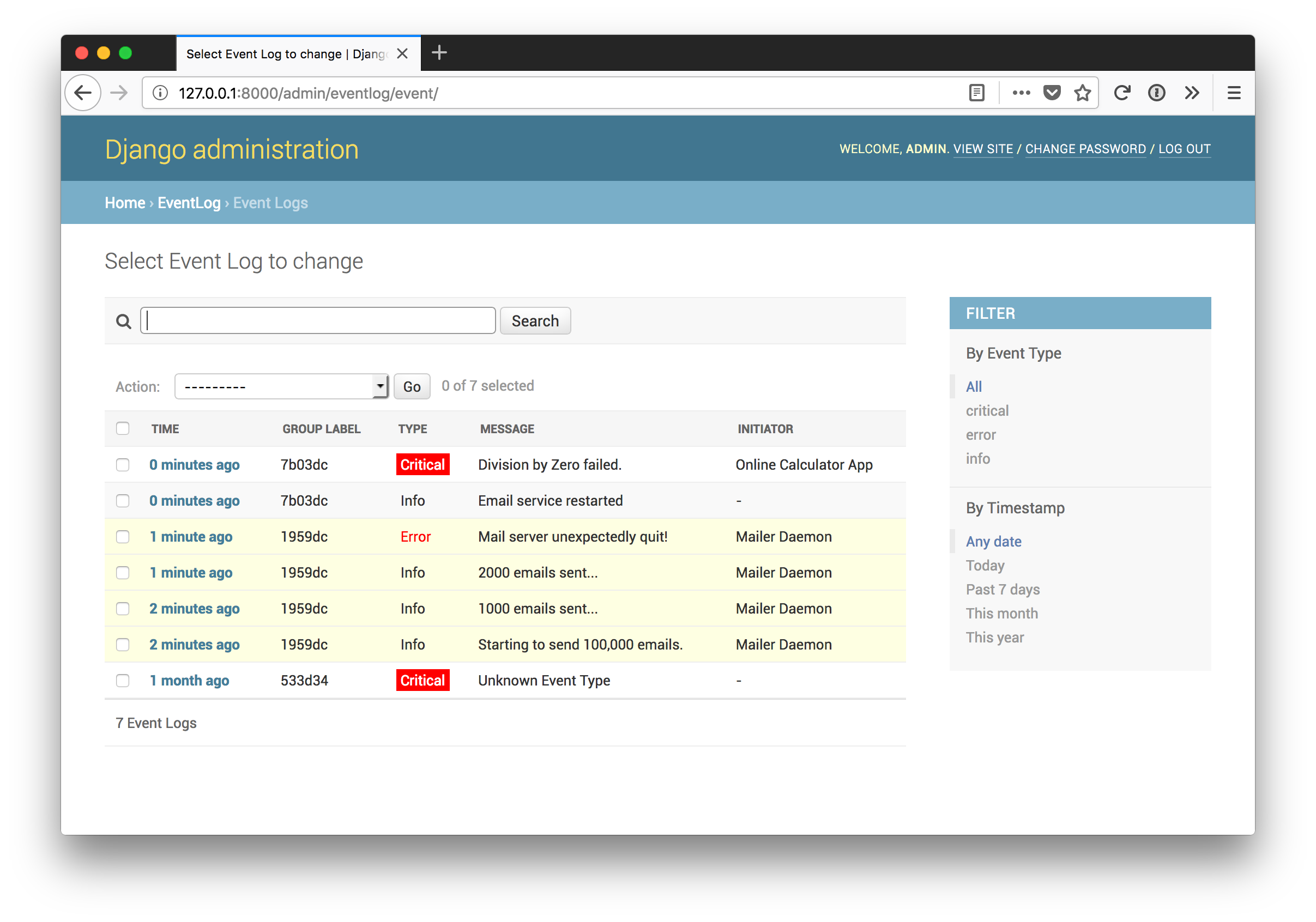django-eventlog stores event messages in a Django model.
Project description
📖 Full documentation: https://barttc.github.io/django-eventlog/
Compatibility Matrix:
| Py/Dj | 3.8 | 3.9 | 3.10 | 3.11 | 3.12 |
|---|---|---|---|---|---|
| 3.2 (LTS) | ✓ | ✓ | ✓ | ✓ | ✓ |
| 4.0 | ✓ | ✓ | ✓ | ✓ | ✓ |
| 4.1 | ✓ | ✓ | ✓ | ✓ | ✓ |
| 4.2 (LTS) | ✓ | ✓ | ✓ | ✓ | ✓ |
| 5.0 | — | — | ✓ | ✓ | ✓ |
django-eventlog

django-eventlog is a very simple event logger you can use to track certain actions in your code. Events are stored in a Django model and can be viewed in the Django Admin.
Usage Example:
from eventlog import EventGroup
e = EventGroup() # Start a new Event Group
e.info('About to send 1000 mails.', # Trigger an Event
initiator='Mailer Daemon')
try:
# ... sending 1000 mails
e.info('All emails sent!', # Trigger an Event in the same group,
initiator='Mailer Daemon') # so they are combined in the admin.
except Exception:
e.error('There was an error sending the emails.',
initiator='Mailer Daemon')
You can reuse an event group by specifying a group name and attach optional data. Data must be JSON serializable.
from eventlog import EventGroup
def purchase():
e = EventGroup(group_id=f"Order {self.order.pk}")
e.info("Sent order to Shopify", data={"items": [1, 2, 3]})
def subscribe_newsletter():
e = EventGroup(group_id=f"Order {self.order.pk}")
e.info("User subscribed to newsletter on checkout", data={"email": "user@example.com"})
Events can be grouped in a "Event Group" and when hovering over one item in the admin, all events of the same group are highlighted:
The details view of an event will list all other events of this group so you can track the progress:
While looking similar, it's not intended to be a replacement for your regular Python
logging facility, rather an addition to it.
django-eventlog stores it's data in a regular database model, so each log entry will trigger a SQL Insert. Therefore you should be careful using it in high performance and/or high volume environments.
Changelog
2.0 (2024-03-10)
-
Overall test and code refactor.
-
Documentation now done with MKDocs.
-
Timeline in Admin change form now supports delays of days and hours, instead of just minutes.
-
Backwards incompatible: Removed undocumented
Event.objects.purge()queryset method. -
Backwards incompatible: The list of event types defined in the app config is now set via Python dataclasses rather than a dictionary. The migration is straightforward.
event_types = { "info": { "label": _("Info"), "color": None, "bgcolor": None, }, "warning": { "label": _("Warning"), "color": None, "bgcolor": None, }, ...
The dictionary is now a
EventTypeListofEventTypedataclasses:from django.utils.translation import gettext_lazy as _ from eventlog.datastructures import EventType, EventTypeList # List of event types to be used in events. A list of `EventType` classes event_types = EventTypeList( EventType(name="info", label=_("Info")), EventType(name="warning", label=_("Warning")), EventType(name="error", label=_("Error"), color="red"), EventType(name="critical", label=_("Critical"), color="white", bgcolor="red"), )
You will only need to do this change if you've earlier overridden the event_type property.
1.5 (2024-03-08)
- Event can have optional, JSON serializable data attached.
- Fixed dark mode colors.
- Various Admin UI improvements.
1.4 (2024-03-05)
- Event groups can now have arbitrary names instead of UUIDs.
- Event comments is a textfield.
- Fixed potential migration warnings around AutoFields.
1.3 (2023-10-04)
- Python 3.12 compatibility
- Django 5.0 support
- Type Annotations
1.2 (2023-04-28)
- Python 3.7 to 3.11 compatibility
- Django 3.2 to 4.2 support
1.1 (2018-05-11)
- Added ability to manually set a group id to make an EventGroup object reusable through threads.
1.0 (2018-02-13)
- Production ready 1.0 release.
- The details Admin view now displays all events of the group with an annotated delay, so you can see the progress of the group.
0.9 (2018-02-13)
- Initial release.
- Django 1.8 to 2.0 compatibility.
- Python 2.7 to 3.6 compatibility.
Project details
Release history Release notifications | RSS feed
Download files
Download the file for your platform. If you're not sure which to choose, learn more about installing packages.
Source Distribution
Built Distribution
Hashes for django_eventlog-2.0-py3-none-any.whl
| Algorithm | Hash digest | |
|---|---|---|
| SHA256 | 4c97042588ed2931034efe7e576d079a287caf53b3f8f29cce93801eaaee12e2 |
|
| MD5 | a0ed2b13794027f4edff1f348e88c095 |
|
| BLAKE2b-256 | fb5723a8c14e6a8c1f9b9df4a7b861fc87cf81a494a204fbf6de82a46981260c |
















